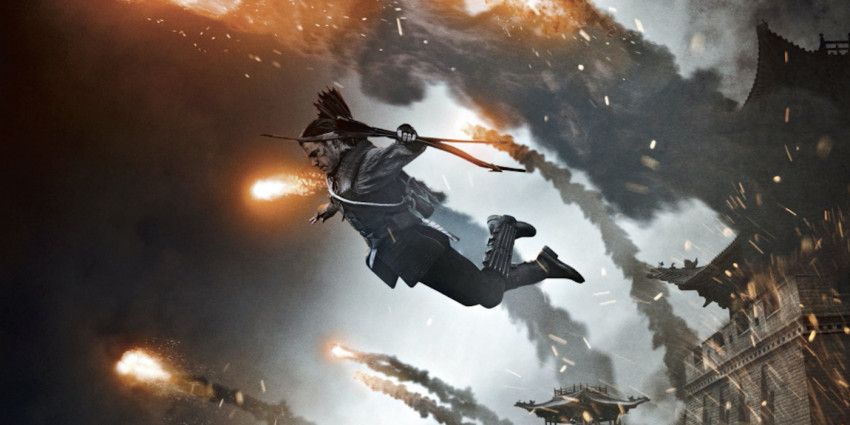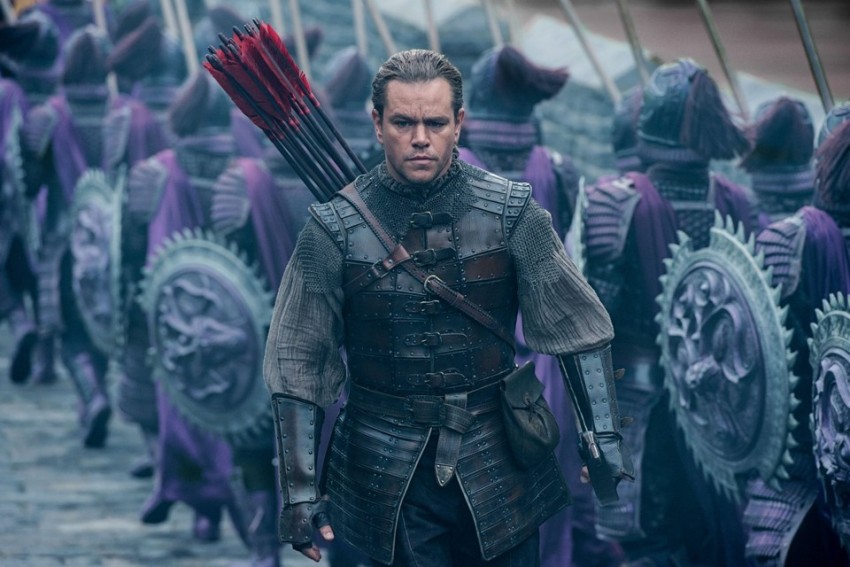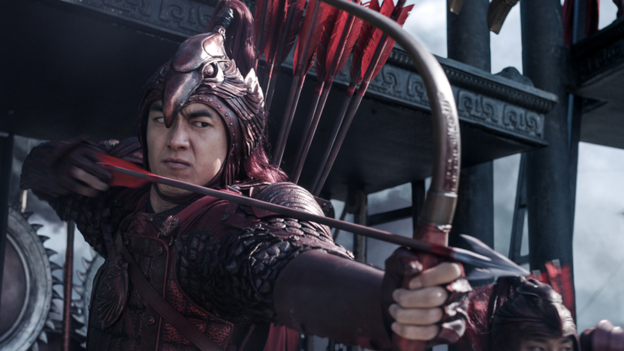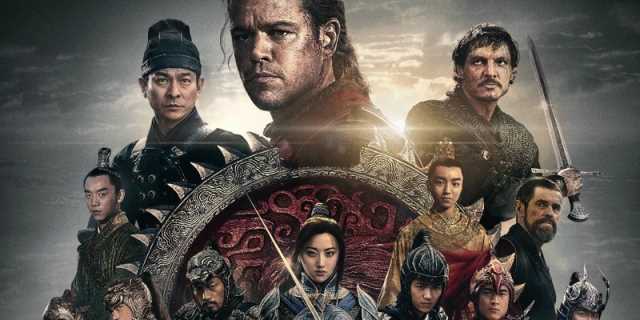The Great Wall
January 9, 2017 · 0 comments
The best Irish-Matt-Damon-fighting-space-lizards movie you will ever see, says Jonathan Clements.
 In the 11th century AD, the last survivors from a group of European mercenaries finally reach their destination – Imperial China. Amid the rainbow-coloured rocks of China’s arid north-west, Irish brawler William (Matt Damon) and Spanish tough-guy Tovar (Pedro Pascal) surrender to the Nameless Order, an elite battalion that guards the Great Wall. William and Tovar are fortune-seekers hoping to return home with the secret of gunpowder, but turn out to be the first scouts to encounter the signs of a new invasion of taotie – alien lizards that have been attacking every 60 years for centuries.
In the 11th century AD, the last survivors from a group of European mercenaries finally reach their destination – Imperial China. Amid the rainbow-coloured rocks of China’s arid north-west, Irish brawler William (Matt Damon) and Spanish tough-guy Tovar (Pedro Pascal) surrender to the Nameless Order, an elite battalion that guards the Great Wall. William and Tovar are fortune-seekers hoping to return home with the secret of gunpowder, but turn out to be the first scouts to encounter the signs of a new invasion of taotie – alien lizards that have been attacking every 60 years for centuries.
Zhang Yimou’s The Great Wall is a glorious mess of a film – a fascinating palimpsest of modern movie-making, and a Chinese box of decisions and countermands behind the scenes. Poke through the ampersands in the script credits, you’ll see signs of it having existed in three or four distinct iterations – with another big-name director once attached, and at least one script doctor. Fans of Max Brooks’ World War Z will see remnants of his particular style, even though his work on the original idea is buried beneath a “Story by” credit. Aficionados of Edward Zwick will see one of his trademark sincere, conflicted protagonists, although Zwick, too, is hidden in the “Story by” ghetto. And connoisseurs of Legendary Pictures will swiftly recognise a Big Dumb Monster Movie in the making.
 The film’s biggest splash in international media has been over the supposed scandal of casting Matt Damon as some kind of white saviour. As director Zhang Yimou commented at the time, easily-offended social justice warriors were basing their ire on viewing a single, misleading trailer. “In many ways, The Great Wall is the opposite of what is being suggested,” he said, leaping to the defence of a movie in which Irish Matt Damon fights lizards from space. “For the first time, a film deeply rooted in Chinese culture, with one of the largest Chinese casts ever assembled, is being made at tent-pole scale for a world audience. I believe that is a trend that should be embraced by our industry.”
The film’s biggest splash in international media has been over the supposed scandal of casting Matt Damon as some kind of white saviour. As director Zhang Yimou commented at the time, easily-offended social justice warriors were basing their ire on viewing a single, misleading trailer. “In many ways, The Great Wall is the opposite of what is being suggested,” he said, leaping to the defence of a movie in which Irish Matt Damon fights lizards from space. “For the first time, a film deeply rooted in Chinese culture, with one of the largest Chinese casts ever assembled, is being made at tent-pole scale for a world audience. I believe that is a trend that should be embraced by our industry.”
Matt Damon’s character arrives in China as a cocksure, self-regarding rogue, interested only in stealing a military secret, only to be dazzled by the suicidal resolve of the Nameless Order. In a replay of the big-picture loyalties of Zhang’s Hero, commander Lin Mae (Jing Tian) scoffs at his willingness to fight under any flag, slowly winning him over to her idea of devotion to a higher cause. As is common with Sino-Hollywood co-productions, the interaction between the male and female lead is entirely lacking in what Russell T Davies calls the common “heterosexuality” of mainstream drama – in fact, Damon has a longer and deeper bromance going on with his co-star Pascal.
If the Westerners are (in a common trope) soulless egomaniacs in need of spiritual counsel, the Chinese come across as earnest but incredibly stupid. They have been fighting a desperate, cyclical war with space lizards for centuries, but do not seem to have ever considered taking the fight to the aliens’ nest in a glowing green mountain during any of the 59-year dormancy periods. Despite realising 900 years earlier that magnets seem to hold off the aliens’ communication with their telepathic queen, they do not act on this intelligence until Matt Damon turns up with a pet rock. As for the space lizards, they are a xeno-biological wonder. They eat like crazy, only to vomit their stomach contents into the mouth of their queen. Meanwhile, the queen is only the size of a minivan, but can somehow digest tonnes of meat from her drones, and pop out thousands of eggs.
 It may seem churlish to bring up realism in a movie in which an inexplicably Irish Matt Damon fights lizards from space, but at least one person in the chain of creation has tried to inject some notes of actual history. Damon drops a reference to fighting “with Harald against the Danes,” but if that were not a hint enough that this is the 11th century, when the scene shifts to the Chinese capital, the city is revealed as what is now Kaifeng, centre of power for the Northern Song dynasty. It is an oddly exacting reference in a film that otherwise plays fast and loose with almost everything, including the laws of physics and biology.
It may seem churlish to bring up realism in a movie in which an inexplicably Irish Matt Damon fights lizards from space, but at least one person in the chain of creation has tried to inject some notes of actual history. Damon drops a reference to fighting “with Harald against the Danes,” but if that were not a hint enough that this is the 11th century, when the scene shifts to the Chinese capital, the city is revealed as what is now Kaifeng, centre of power for the Northern Song dynasty. It is an oddly exacting reference in a film that otherwise plays fast and loose with almost everything, including the laws of physics and biology.
The taotie space lizards are based on odd designs found on ancient Chinese bronzeware, although nobody in the movie bothers to explain this. China in the Northern Song dynasty was, indeed, just about to be overwhelmed by invaders from the north, but it turned out to be the Khitan nomads, a truly daunting force, depicted here as little more than a posse of archers riding in around in circles in the desert. And with a weary sigh, the historian is obliged to note that the Great Wall as we know it only took on the shape seen in this movie in the Ming dynasty, about 500 years after the time in which this film is set. Yes, yes, I know, I am trying to inject a note of historical context into a film in which an Irish Matt Damon fights lizards from space. I’ll stop.
The credits list a veritable army of over a hundred “translators” (I think they mean interpreters), whose job it was to ensure ease of communication between the various departments. This is not only a matter of some amusement – there were three “grip translators”, a job that I have often wished was available for English-to-grip interpreting on English-speaking film sets, but also “editorial translators”. It’s only as the translation credits build and build, like space lizards pig-piling their way into the upper floors of a pagoda, that one realises the implication. It leaves the viewer musing, like Captain Kirk’s “What does God need with a starship?” – Why does Zhang Yimou need an editorial translator? Plainly, Matt Damon’s character is not the only white man calling the shots on this production. As one might expect for a film that involves alien lizards, Zhang Yimou is very much a work-for-hire.
I say this with love: Legendary Pictures has impressively seized the high ground of Big Dumb Monster Movies, with a canny appreciation of the way to win in the Asian market. The Great Wall arrives on the heels of Warcraft, Godzilla and Pacific Rim. But Legendary, along with its frequent collaborator Atlas, is also a muscular warhorse in the industry, with powerful contacts thanks to its acquisition by China’s Wanda conglomerate, and the wherewithal to throw real money at its staff. Which brings us to Zhang Yimou, acclaimed director of House of Flying Daggers and Hero, caught fathering seven children in the land of the One-Child Policy, and hence presumably in need of immediate cash to pay the seven-figure fine. Zhang embraces this journeyman job with gusto, presenting a colour-coded wuxia legion in fruity armour that makes them look like refugees from the Power Rangers. Archers, engineers and infantry rub shoulders with blue-clad gymnasts on bungee cords (something of a… tribute to Attack on Titan), while catapults fling smoking missiles across a vast white sky, like ink across a Chinese painting.
 A sense is starting to build of Chinese Coproduction Bingo, as we tick off the boxes of the kind of decisions that are made on a multi-million dollar blockbuster that somehow has to succeed in America and in China, soon to be the world’s largest film market. Big names like Andy Lau lurk among the spear-carriers, dying off-screen to satisfy the film’s teen-pleasing certification. Blink and you will miss Pilou Asbaek, who has barely a line before he is eaten by a lizard from space. Eddie Peng has a ridiculous story arc as a discredited soldier who is demoted to kitchen duties, signified by putting a little apron over his armour. Meanwhile, the space lizards are visceral, weighty creations singly and in close-up, gnashing their teeth and spurting green ichor. In long-shots, the film-makers simply clone them in their thousands – as with World War Z, more becomes palpably less, as the cast flee from weightless, super-abundant hordes of digital sprites.
A sense is starting to build of Chinese Coproduction Bingo, as we tick off the boxes of the kind of decisions that are made on a multi-million dollar blockbuster that somehow has to succeed in America and in China, soon to be the world’s largest film market. Big names like Andy Lau lurk among the spear-carriers, dying off-screen to satisfy the film’s teen-pleasing certification. Blink and you will miss Pilou Asbaek, who has barely a line before he is eaten by a lizard from space. Eddie Peng has a ridiculous story arc as a discredited soldier who is demoted to kitchen duties, signified by putting a little apron over his armour. Meanwhile, the space lizards are visceral, weighty creations singly and in close-up, gnashing their teeth and spurting green ichor. In long-shots, the film-makers simply clone them in their thousands – as with World War Z, more becomes palpably less, as the cast flee from weightless, super-abundant hordes of digital sprites.
The film is already well on the way to recouping its production budget in the Chinese territory alone. Although the marketing costs are an unknown quantity, this still means that rest of the world is frankly an afterthought, and The Great Wall’s release schedule seems to reflect this. On the understanding that a film in which Irish Matt Damon fights space lizards is not going to need a quick release ahead of the Oscars, it is not even scheduled to hit the US market until next month, although I was able to catch it in Finland, where the Finnish-Swedish ancestry of Damon’s mother makes him a honorary local boy. Most notable about the Finnish screening was the effect that Zhang Yimou’s framing had on the subtitles; he fills the screen so well that there is often no place for the subtitles to hide, and they are forced to dart left and right on the screen to make space for the imagery.
The Great Wall is certainly an indicator of an ongoing trend; one I have discussed before as the sheer size of China’s box office begins to drive film financing worldwide. Finding a topic that can please East and West, without inciting the cultural appropriation lobby or provoking the Communist Party is a tall order. There are, in fact, true stories in Asian history that make tales of invading space lizards look like Raise the Red Lantern, but bringing to them the screen takes a bunch of lucky breaks, roulette spins and traversing of logistic minefields. The Great Wall is, at least, fun. It has a surer touch than its predecessors, the incoherent and unwatchable Dragon Blade and Outcast. Instead, it goes the Warcraft route, hitching its wagon to the surfaces and glitter of a gamified narrative, where resources and equipment are supplied by magic in moments, and hard-pressed military men have the time and inclination to make shiny animal-themed armour. But the competent reviewer must judge any film on the parameters that film sets for itself, and we surely must conclude that The Great Wall is the best Irish-Matt-Damon-fighting-space-lizards movie ever made.
Jonathan Clements is the author A Brief History of the Martial Arts.
Leave a Reply